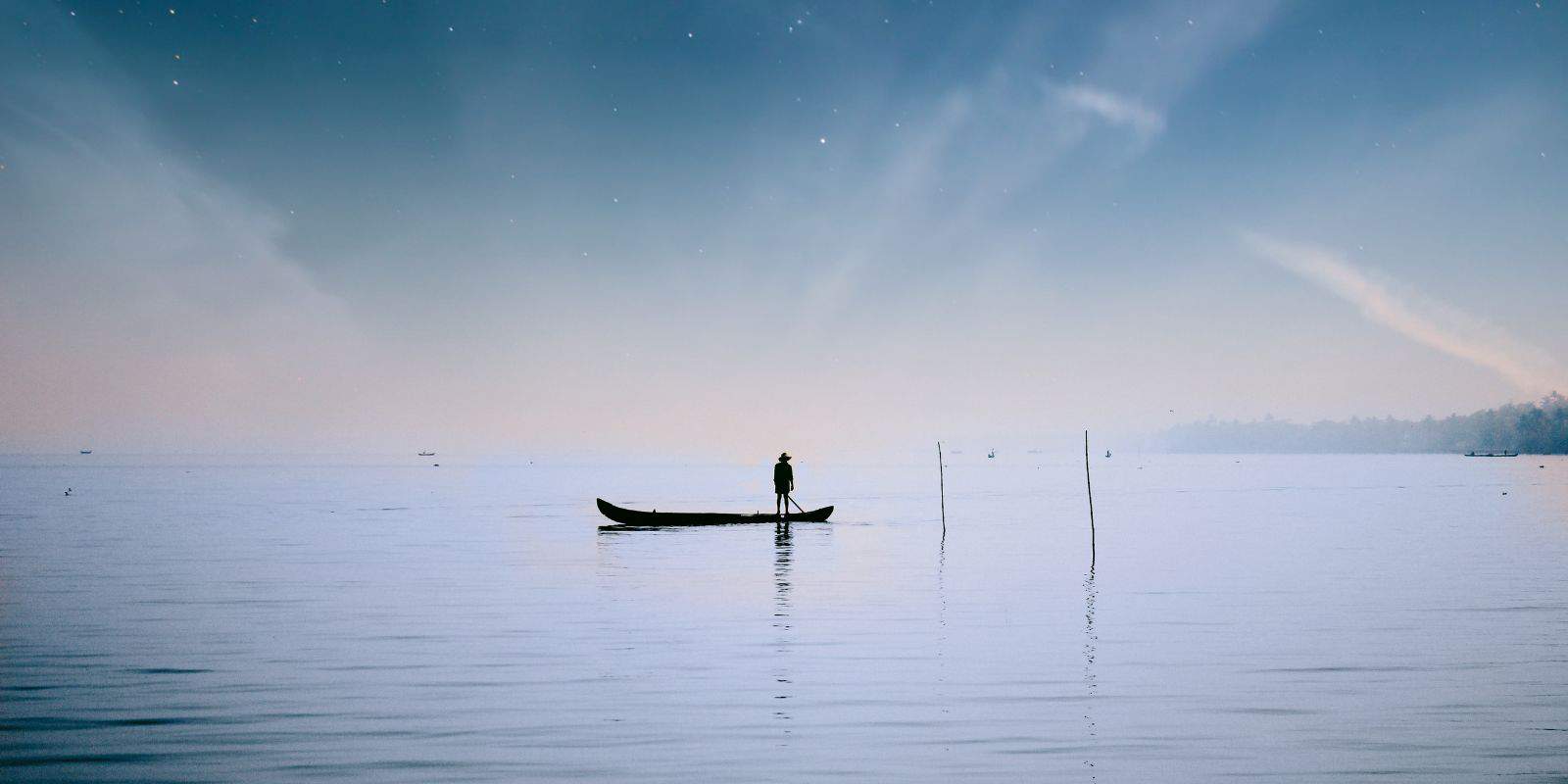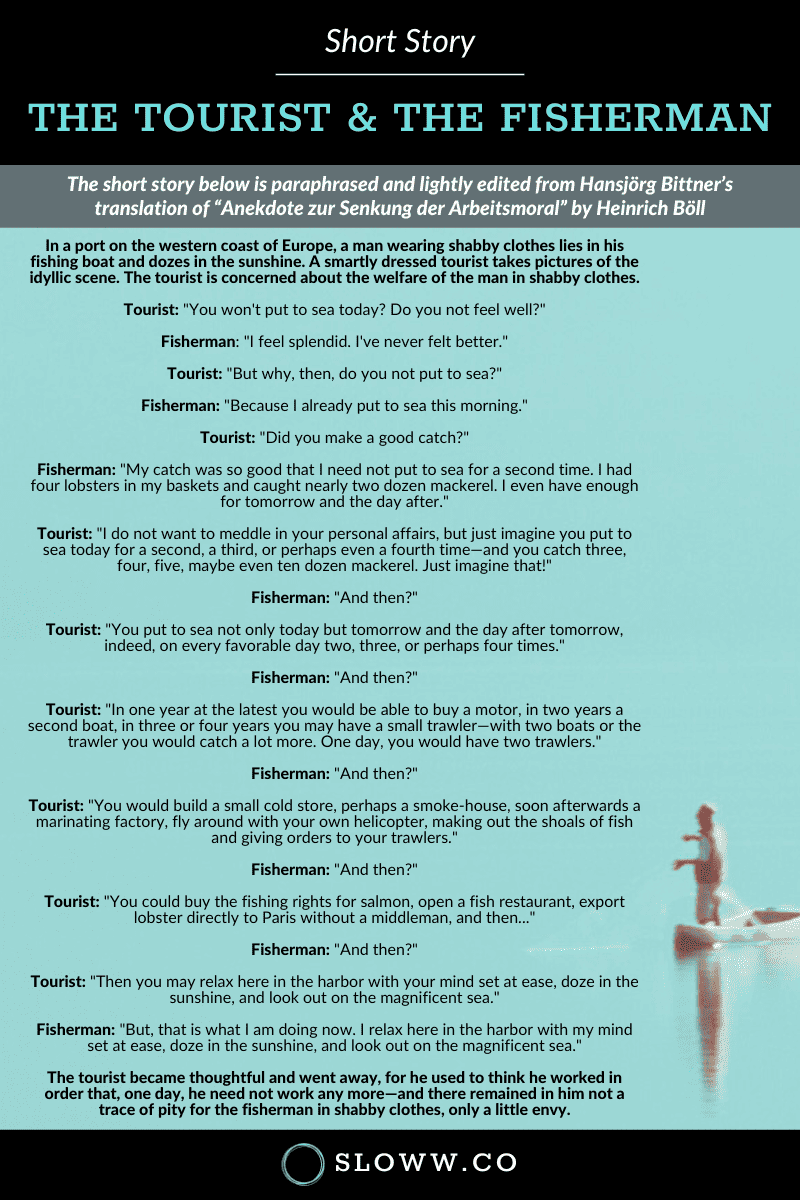The short story or parable of the tourist and the fisherman (also known as the parable of the Mexican fisherman, the businessman and fisherman, etc) is one of my favorite short stories.

“And then?” Short Story of The Tourist & The Fisherman
After reading the story of “The Mexican Fisherman” in Erin Loechner’s book Chasing Slow (Book Summary). I did some quick searching to try to find the author and when it was originally published.
Interestingly, it doesn’t seem to pop up in Google search results until February 1, 2001. After some deeper investigative work, it looks like the original story was published in 1963 by German writer Heinrich Böll as Anekdote zur Senkung der Arbeitsmoral—translated as “Anecdote Concerning the Lowering of Productivity” or “Anecdote on Lowering the Work Ethic” (Wikipedia).
“Original” is almost always up for debate. It’s most likely that this is an ancient story passed down by generations in different ways (see the comment on this post below). Even though it’s been adapted many ways over the years, the slow living message remains the same. Below, I’ve outlined the original version as well as a modern adaptation. Enjoy! And, always remember to ask yourself, “And then?”
If you want to watch a short video to get the gist, I enjoyed this version:
Original Version: The Tourist & The Fisherman

This version is paraphrased and lightly edited from Hansjörg Bittner’s translation of “Anekdote zur Senkung der Arbeitsmoral” by Heinrich Böll (PDF):
In a port on the western coast of Europe, a man wearing shabby clothes lies in his fishing boat and dozes in the sunshine. A smartly dressed tourist takes pictures of the idyllic scene. The tourist is concerned about the welfare of the man in shabby clothes.
Tourist: “You won’t put to sea today? Do you not feel well?”
Fisherman: “I feel splendid. I’ve never felt better.”
Tourist: “But why, then, do you not put to sea?”
Fisherman: “Because I already put to sea this morning.”
Tourist: “Did you make a good catch?”
Fisherman: “My catch was so good that I need not put to sea for a second time. I had four lobsters in my baskets and caught nearly two dozen mackerel. I even have enough for tomorrow and the day after.”
Tourist: “I do not want to meddle in your personal affairs, but just imagine you put to sea today for a second, a third, or perhaps even a fourth time—and you catch three, four, five, maybe even ten dozen mackerel. Just imagine that!”
Fisherman: “And then?”
Tourist: “You put to sea not only today but tomorrow and the day after tomorrow, indeed, on every favorable day two, three, or perhaps four times.”
Fisherman: “And then?”
Tourist: “In one year at the latest you would be able to buy a motor, in two years a second boat, in three or four years you may have a small trawler—with two boats or the trawler you would catch a lot more. One day, you would have two trawlers.”
Fisherman: “And then?”
Tourist: “You would build a small cold store, perhaps a smoke-house, soon afterwards a marinating factory, fly around with your own helicopter, making out the shoals of fish and giving orders to your trawlers.”
Fisherman: “And then?”
Tourist: “You could buy the fishing rights for salmon, open a fish restaurant, export lobster directly to Paris without a middleman, and then…”
Fisherman: “And then?”
Tourist: “Then you may relax here in the harbor with your mind set at ease, doze in the sunshine, and look out on the magnificent sea.”
Fisherman: “But, that is what I am doing now. I relax here in the harbor with my mind set at ease, doze in the sunshine, and look out on the magnificent sea.”
The tourist became thoughtful and went away, for he used to think he worked in order that, one day, he need not work any more—and there remained in him not a trace of pity for the fisherman in shabby clothes, only a little envy.
Modern Adaptation: Parable of the Mexican Fisherman
This version comes from Chasing Slow by Erin Loechner (Book Summary):
The American investment banker was at the pier of a small coastal Mexican village when a small boat with just one fisherman docked. Inside the small boat were several large fin tuna. The American complimented the Mexican on the quality of his fish and asked how long it took to catch them.
The Mexican replied, “Only a little while.”
The American then asked why he didn’t stay out longer and catch more fish.
The Mexican said he had enough to support his family’s immediate needs.
The American then asked, “But what do you do with the rest of your time?”
The Mexican fisherman said, “I sleep late, fish a little, play with my children, take siesta with my wife, Maria, stroll into the village each evening where I sip wine and play guitar with my amigos. I have a full and busy life.”
The American scoffed. “I am a Harvard MBA and could help you. You should spend more time fishing and with the proceeds, buy a bigger boat, and with the proceeds from the bigger boat, you could buy several boats. Eventually, you would have a fleet of fishing boats. Instead of selling your catch to a middleman, you would sell directly to the processor, eventually opening your own cannery. You would control the product, processing, and distribution. You would need to leave this small coastal fishing village and move to Mexico City, then LA and eventually NYC, where you will run your expanding enterprise.”
The Mexican fisherman asked, “But how long will this take?”
To which the American replied, “Fifteen to twenty years.”
“But what then?”
The American laughed and said that’s the best part. “When the time is right, you would announce an IPO and sell your company stock to the public and become very rich; you would make millions.”
“Millions?” asked the fisherman. “Then what?”
The American said, “Then you would retire. Move to a small coastal fishing village where you would sleep late, fish a little, play with your kids, take siesta with your wife, stroll to the village in the evening, sip wine, and play guitar with your amigos!”
You May Also Enjoy:
- Browse all simple & short stories
- “Maybe”: A Simple Story about Non-Judgement
- Parable of the Farmer who Lost his Horse: Lessons on Luck, Non-Judgment, & Interconnectedness
- Blind Men and The Elephant: A Short Story about Perspective
- Parable of the Beggar: The Treasure You Seek is Within You





I FOUND EVEN OLDER ORIGINS OF THE STORY.
It appears Heinrich Boll may have been inspired by a story written about 2000 years ago about events more than 300 years before that. The author was Plutarch. The story was about Pyrrhus, the one who gave us “Pyrrhic Victories“.
You can compare it to the original here. But on page 141 of my book, I retell it this way (with anything in quotation marks directly sourced from Plutarch):
Pyrrhus was making preparations to invade Italy and attack Rome when Cineas struck up a conversation.
“The Romans, sir, are reported to be great warriors,” said Cineas. “If God permits us to overcome them, how should we use our victory?”
“But that’s obvious,” said Pyrrhus. “We will be ‘masters of all Italy’ with all its wealth.”
“And having subdued Italy, what shall we do next?” asked Cineas.
“Sicily,” replied Pyrrhus without missing a beat. “A wealthy and populous island, and easy to be gained.”
“But will the possession of Sicily put an end to the war?” asked Cineas.
“God grant us victory and success in that,” answered Pyrrhus, “and we will use these as forerunners of greater things; who could forbear from Libya and Carthage then within reach?” Once we have those, will anybody anywhere “dare to make further resistance?”
“None,” replied Cineas, which leaves us to “make an absolute conquest of Greece. And when all these are in our power, what shall we do then?
Pyrrhus smiled and said, “We will live at our ease, my dear friend, and drink all day, and divert ourselves with pleasant conversation.”
“And what hinders us,” said Cineas, “from doing exactly that right now, without going through all these troubles?”
Pyrrhus suddenly looked “troubled” and had no answer. Then he went ahead and invaded Italy anyway — without success.
Amazing! Thanks so much for sharing, Amit. This version is even more powerful and relevant today.
This is excellent!
Beautiful. Broadens the application of the story and lesson.